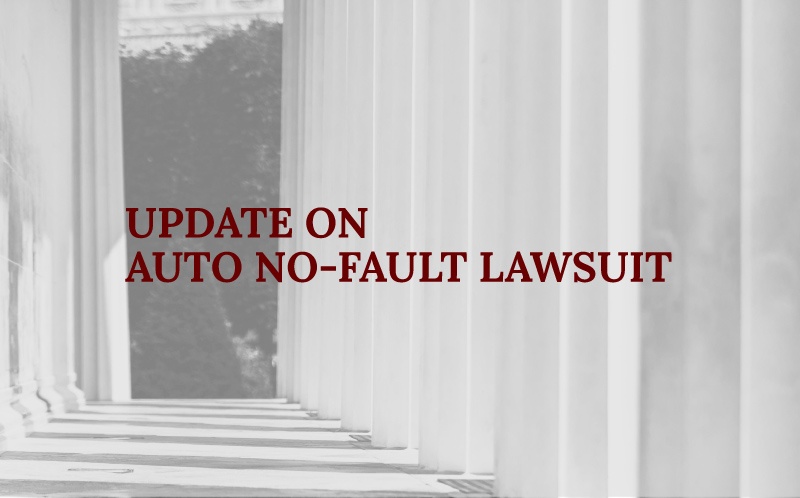Update on Auto No-Fault Lawsuit Regarding Attendant Care, Provider Fee Schedule

We recently published two separate blog posts regarding the auto no-fault lawsuit filed on behalf of several plaintiffs challenging the constitutionality of the reformed law. In particular, this lawsuit challenges the 56-hour cap on family provided attendant care as well as the 55% fee schedule that applies to the services not compensable under the Medicare fee schedule. This article seeks to provide readers with an update on the auto no-fault lawsuit.
Court Grants Defendants’ Motion
On November 13, 2020, the Ingham County Circuit Court issued an order granting the defendants’ motion on all counts. In summary, the court held that there was no retroactive interference with contracts because no-fault insurance is a highly regulated industry. Thus contracts for no-fault insurance cannot be immunized against changes to the underlying law. The court further held that there was no infringement upon due process or equal protection rights because fundamental rights were not implicated and the legislature had a rational basis in reducing insurance costs and fraud in enacting said limitations.
Plaintiffs File Motion for Reconsideration and Motion to Amend Complaint
On December 4, 2020, the plaintiffs filed both a Motion for Reconsideration and a Motion to Amend Complaint. The basis for these motions was the plaintiffs’ request in a prior briefing that, should the court dismiss the constitutional claims, the plaintiffs should be allowed to amend their Complaint to add a breach of contract argument. This breach of contract argument is based on the case of Lafontaine Saline, Inc v Chrysler Group, LLC, 496 Mich 26 (2014), which stands for the proposition that the statute that was in effect at the time the contract was entered into controls the terms of the contract.
Accordingly, the plaintiffs assert that the legislature cannot retroactively change the terms and the level of benefits they are receiving pursuant to the contractual agreements with their no-fault insurers. Plaintiffs bought no-fault policies with unlimited attendant care benefits and without the imposition of fee schedules. The premiums the plaintiffs paid were priced based on these levels of benefits. Now, the legislature is attempting to retroactively take away these benefits, resulting in a fundamentally unfair and inequitable windfall to insurers.
Next Steps for Auto No-Fault Lawsuit
The next step is for the court to make a decision on our plaintiffs’ motions. A hearing is currently scheduled for January 7, 2021. Ordinarily, defendants are not required to respond to a Motion for Reconsideration under the court rules. However, in this case, the court has ordered the defendants to file a response, which is due on December 30, 2020. If the court denies our Motion for Reconsideration, we will have 21 days to appeal the decision to the Court of Appeals. If the court grants our Motion for Reconsideration, it will likely want more briefing on the amendment issue, which will keep this case in the trial court for a few more months.
February 18, 2021 Update: The Court denied our Motion to Amend. Our next step in this case is to appeal.
We will continue to provide updates on the auto no-fault lawsuit as developments continue.
Authored by Lansing auto accident attorney, Lauren Kissel

